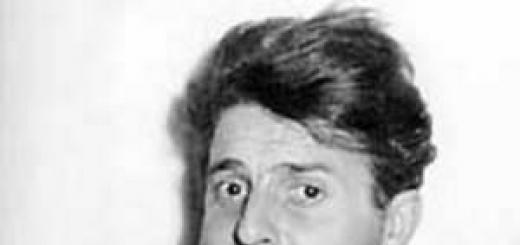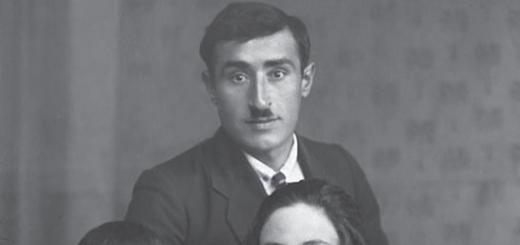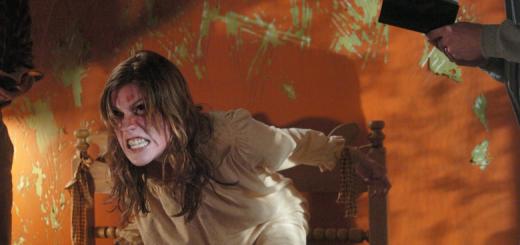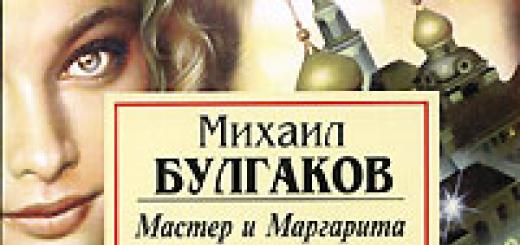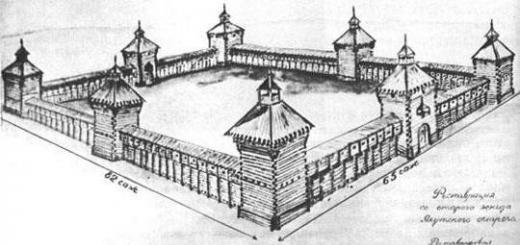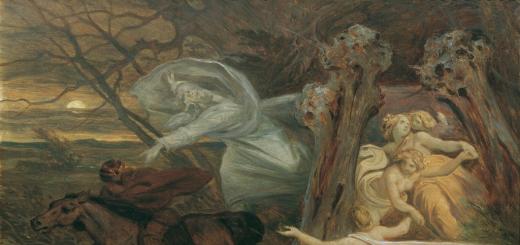Arguing your opinion on a chosen issue is one of the most important tasks when writing an argumentative essay. Since arguments from the literature are rated higher, it is very important to prepare them in advance. On this page I present a number of arguments on several popular issues.
PROBLEM: Meanness, betrayal, dishonor, envy.
- A.S. Pushkin, novel “The Captain's Daughter”
Shvabrin is a nobleman, but he is dishonest: he takes revenge on Masha Mironova for her refusal, and during a duel with Grinev, he stabs him in the back. The complete loss of ideas about honor and dignity provokes him to betrayal: he goes over to the camp of the rebel Pugachev.
- Karamzin “Poor Liza”
Erast, the heroine’s lover, betrayed his feelings for the girl, choosing material well-being
- N.V. Gogol, story “Taras Bulba”
Andriy, the son of Taras, being captured by love feelings, betrays his father, brother, comrades, and homeland. Bulba kills his son because he cannot live with such shame
- A.S. Pushkin, tragedy "Mozart and Salieri"
The envious Salieri, jealous of the success of the great composer Mozart, poisoned him, although he considered him his friend.
PROBLEM: Worship of rank, servility, servility, opportunism.
1. A.P. Chekhov, story “The Death of an Official”
The official Chervyakov is infected with the spirit of veneration: Having sneezed and splashed the general’s bald head, he was so frightened that after repeated humiliations and requests, he died of fear.
2. A.S. Griboyedov, comedy "Woe from Wit"
Molchalin, the negative character of the comedy, is sure that you need to please everyone without exception. This will allow you to climb the career ladder. Caring for Sophia, Famusov's daughter, he pursues precisely this goal.
PROBLEM: Bribery, embezzlement
- N.V. Gogol, comedy "The Inspector General"
The mayor, like all officials of the district city, is a bribe-taker and embezzler. He is convinced that all issues can be solved with the help of money and the ability to show off.
- N.V. Gogol, poem "Dead Souls"
Chichikov, drawing up a bill of sale for the “dead” souls, gives a bribe to the official, after which things move faster.
PROBLEM: Rudeness, ignorance, hypocrisy
- A.N. Ostrovsky, drama "The Thunderstorm"
Dikoy is a typical boor who insults everyone around him. Impunity gave rise to complete unbridledness in this man.
- DI. Fonvizin, comedy "Minor"
Mrs. Prostakova considers her boorish behavior to be normal, which is why the people around her are “brutes” and “morons.”
- A.P. Chekhov, story "Chameleon"
Police warden Ochumelov grovels before those who are above him on the career ladder, and feels like a master of the situation before those who are below. This is reflected in his behavior, which changes depending on the situation.
PROBLEM: The destructive influence of money (material goods) on the human soul, hoarding
- A.P. Chekhov, story “Ionych”
Doctor Startsev, a promising and talented doctor in his youth, turns into Ionych’s hoarder. The main passion of his life is money, which became the cause of moral decay of the individual.
- N.V. Gogol, poem “Dead Souls”
The stingy landowner Plyushkin personifies complete spiritual degradation. The passion for hoarding became the reason for the destruction of all family and friendly ties; Plyushkin himself simply lost his human appearance.
PROBLEM: Vandalism, unconsciousness
- I.A. Bunin "Cursed days"
Bunin could not even imagine that the brutality and vandalism brought by the revolution would turn people into a maddened crowd, destroying everything in its path.
- D.S. Likhachev, book “On the Good and the Beautiful”
The Russian academician was outraged when he learned that the monument to Bagration’s grave was blown up on the Borodino field. This is a terrible example of vandalism and oblivion.
- V. Rasputin, story “Farewell to Matera”
When villages were flooded, not only people’s homes went under water, but also churches and graveyards, which is a terrible example of vandalism.
PROBLEM: The role of art
- A.T. Tvardovsky, poem “Vasily Terkin”
Front-line soldiers say that soldiers exchanged smoke and bread for clippings from front-line newspapers, where chapters of the poem were published. This means that an encouraging word was sometimes more important than food.
Natasha Rostova sings beautifully, at these moments she becomes unusually beautiful, and people around her are drawn to her.
- A.I. Kuprin, story “Garnet Bracelet”
Listening to Beethoven’s “Moonlight Sonata,” Vera experienced, thanks to the hopelessly in love Zheltkov, a feeling similar to catharsis. Music awakened in her empathy, compassion, and a desire to love.
PROBLEM: Love for the Motherland, nostalgia
- M.Yu. Lermontov, poem “Motherland”
The lyrical hero loves his homeland as it is, and is ready to go through all the trials with his people.
- A. Blok, poem “Russia”
For the lyrical hero Blok, love for the homeland is similar to love for a woman. He believes in the great future of his country.
- I.A. Bunin, stories “Clean Monday”, “Antonov Apples”
I.A. Bunin left Russia forever in 1920. A feeling of nostalgia haunted him all his life. The heroes of his stories recall the great past of Russia, which was irretrievably lost: history, culture, traditions.
PROBLEM: Loyalty to your word (duty)
- A.S. Pushkin, novel “Dubrovsky”
Masha, married to an unloved man, refuses to break the oath of fidelity given in the church when Dubrovsky tries to save her.
- A.S. Pushkin, novel “Eugene Onegin”
Tatyana Larina, true to her marital duty and her given word, is forced to refuse Onegin. She became the personification of human moral strength.
PROBLEM: Self-sacrifice, compassion, mercy, cruelty, humanism
- M.A. Bulgakov, novel “The Master and Margarita”
Margarita, who loves the Master, in spite of everything, is true to her feelings, she is ready for any sacrifice. A woman flies to Woland's ball to save her beloved. There she asks to free the sinner Frida from suffering.
- A.I. Solzhenitsyn, story "Matrenin's Dvor"
Matryona lived all her life for people, helping them without asking for anything in return. The author calls her a “truthful woman,” a person who lives according to the laws of God and conscience
- L. Andreev, story “Biter”
By taming a dog and leaving it in a holiday village for the winter, people showed their selfishness and showed how cruel they could be.
The Cossack Gavrila, having lost his son, fell in love with a stranger, an enemy, as if he were his own. Hatred for the “Reds” grew into fatherly love and care.
PROBLEM: Self-education, self-education, self-analysis, self-improvement
- I.S. Turgenev, novel “Fathers and Sons”
The nihilist Bazarov believed that “every person must educate himself.” And this is the lot of strong people.
- L.N. Tolstoy, trilogy “Childhood. Adolescence. Youth"
Nikolenka is an autobiographical hero. Like the author himself, he strives for self-improvement and creative self-realization.
- M.Yu. Lermontov, novel “Hero of Our Time”
Pechorin talks with himself in his diary, evaluates his actions, analyzes his life, which testifies to the depth of this personality.
- L.N. Tolstoy, novel "War and Peace"
The writer showed us the “dialectics of the soul” of Bolkonsky and Bezukhov, told us how difficult a person’s path to truth, justice, and love is. His heroes made mistakes, suffered, suffered, but this is the idea of human self-improvement.
PROBLEM: Courage, heroism, moral duty, patriotism
- B. Vasiliev, “And the dawns here are quiet”
The female anti-aircraft gunners, destroying a detachment of saboteurs, died, despite the numerical superiority of the enemy.
- B. Polevoy, “The Tale of a Real Man”
Pilot Alesey Maresyev, thanks to fortitude and courage, not only survived after amputation of his legs, but also became a full-fledged person and returned to his squadron.
- Vorobyov, story “Killed near Moscow”
The Kremlin cadets, showing courage and heroism, fulfilled their patriotic duty, defending the approaches to Moscow. Lieutenant Yastrebov is the only one left alive.
- M. Sholokhov, story “The Fate of a Man”
The hero of the story, Andrei Sokolov, went through the entire war: he fought bravely, was captured, and escaped. He fulfilled his civic duty with honor. The war took his family away from him, but, fortunately, fate gave him a meeting with Vanyushka, who became his son.
- V. Bykov “Crane cry”
Vasily Glechik, still just a boy, did not leave his position during the war. The thought of salvation was unacceptable to him. He did not violate the battalion commander’s order, fulfilled it at the cost of his own life, and remained faithful to his oath and duty to his homeland.
“Antonov Apples” is a story by Bunin, published in 1900. The work is built on a lyrical monologue-memory. What is the main theme of Bunin's Antonov Apples? What events inspired the writer to create this work?
Ivan Bunin
The analysis of “Antonov Apples,” like any similar task, should begin with brief information about the author. Ivan Bunin entered literature not as a prose writer, but as a poet. However, the debut collection of poems, which was published in Orel, did not cause much reaction from critics. Bunin received recognition after the publication of the book “Falling Leaves,” which also included exclusively poems.
Ivan Bunin left a deep and bright mark on Russian literature. In his lyrical works he continued classical traditions A. Fet, Y. Polonsky, A. Tolstoy. In stories and tales he showed, often with a nostalgic mood, the impoverishment of noble estates, the cruel face of the village, and the disastrous oblivion of the moral foundations of life. Bunin became a classic of Russian literature thanks to such prose works as “The Life of Arsenyev”, “Easy Breathing”, “Cursed Days”, “Antonov Apples”.
An analysis of a work of art cannot do without a brief history of the creation of the work. How did the idea for the story come about?

The history of the creation of "Antonov apples"
Ivan Alekseevich Bunin planned to write this work back in the early nineties of the 19th century. Then he was visiting his relative's estate. One day I went out onto the porch and smelled the amazing, unique smell of apples. At the same time, he experienced nostalgia for serfdom.
When analyzing “Antonov Apples,” it should be said that in this work the author glorified the old landowner life. The main theme of the story is lyrical memories of noble culture. Many of Bunin’s works, including “Antonov Apples,” are permeated with nostalgia for the past.
An analysis of a writer’s work involves a presentation of the main facts from his biography. As you know, Bunin left Russia. But this happened many years after the publication of the story. However, already at the beginning of the century, Russia was not the same as depicted in the work “Antonov Apples”. Bunin's heroes are images from a past, happier life.

Vyselki
The lyrical hero remembers the past. In his imagination there appears an early golden autumn, a thinned garden, and the incomparable aroma of apples. The author recalls Vyselki, a village that has been known in the area since the time of his grandfather as the richest. The houses here were strong and made of brick. There was also a small estate with an apple orchard.
Arseny Semyonich
The hero also remembers people who have long been dead. And first of all, the late relative Arseny Semyonich. He was an avid hunter. A lot of people gathered at his house. The table was laden with food, and after dinner the owner and his guests went hunting. The horn sounded and the dogs howled. The author remembers horseback riding, the cries of hunters...

Years have passed
But what the lyrical hero remembers is long gone. The village still stands the same. What is she without her owners? Arseny Semyonich shot himself. The owner of the estate and apple orchard died. The kingdom of impoverished nobles has arrived.
Happy times are a thing of the past. Now the nobles are no longer the same, they are impoverished. True, they still gather at each other’s houses in the evenings. But life will never be the same. The harsh rural reality is shown. And the author wonders how to live now. But this life is not so bad... And again the author betrays himself colorful description of rural life, still not suspecting anything that the small landed nobility had very little time left to exist.
Analysis
What problems did Bunin raise in Antonov Apples? The author showed how the patriarchal world is becoming a thing of the past, village estates are going bankrupt and disappearing. In his work, the writer made a kind of study of the historical foundations of the Russian village, tried to grasp the reasons for their collapse, and understand what new life brings to each individual person.
The story “Antonov Apples” is surprisingly poetic. However, the lyrical hero seems to be hidden from the reader. His story remains unknown. The reader only knows that the men call him “barchuk.” The emphasis in the work is on associations, memories of the past.
When a person is closer to nature, his life and relationships with others are simpler. Bunin clearly showed in this story the idea of disastrous and doomed beauty. The idea of the common destinies of the nobility and peasantry sweeps through the entire work. After all, everyone is equally threatened with death.

Image of Russia
The book “Antonov Apples” is a unique look at Russia. For some, their native land is associated with Antonov apples, honey and morning freshness. For others - on a frosty winter morning. Like no one else, Bunin was able to discover the beauty of Russia, the tenderness of his native nature. After all, even readers who have never been to the village and can hardly imagine the smell of apples are imbued with rural old landowners landscapes created by this writer.
Criticism
The story caused a mixed reaction in the literary community. Maxim Gorky, having read Bunin’s work, said that the author managed to “sing beautifully, sincerely, juicily.” However, the Petrel of the Revolution did not like Bunin's idea. He expressed categorical disagreement with the philosophical concept of the work. The most widely read newspaper in the capital greeted Antonovsky Apples with bewilderment. A well-known publicist noted: “Bunin writes about everything that comes to his hand, and therefore it is impossible to read to the main thing.”
Five years after the publication of the story, a parody of Kuprin appeared in the magazine “Zhupel”. This essay contained the following words: “Where are you, the wonderful time of Antonov apples, serf souls, ransom payments?” There is a version that the parody became Kuprin’s revenge on the “nobleman after his mother” - this is what the aristocrat Bunin once had the imprudence to call his colleague. By the way, Kuprin called his satirical work not at all poetically - “Pies with Mushrooms.”
History of creation
The story “Antonov Apples” is one of the first prose works by I.A. Bunina. It was first published in the October 1900 issue of Life magazine.
Meaning of the name
Antonov apples or Antonovka are a special variety of apples with which the author associates the warmest and happiest memories. The peasants compared their well-being with their productivity: “A vigorous Antonovka - for a cheerful year,” “if an Antonovka crop is born, then the grain is born.”
The main theme of the work
The main theme of the work is the steady degeneration of the Russian nobility.
 Bunin grew up under the enormous influence of noble class traditions. His childhood was spent in a provincial estate, where the future writer became closely acquainted with village life. At nineteen, he was forced to leave his family nest, which had fallen into disrepair. The pain of this loss haunted him throughout his life.
Bunin grew up under the enormous influence of noble class traditions. His childhood was spent in a provincial estate, where the future writer became closely acquainted with village life. At nineteen, he was forced to leave his family nest, which had fallen into disrepair. The pain of this loss haunted him throughout his life.
Unlike representatives of the democratic trend in Russian literature, Bunin defended the right to exist of the once dominant class. He did not see much difference between the life of the peasants and the middle and small nobility. The writer had sufficient grounds for such an opinion. Many of the most vehement denouncers of the landowners and defenders of the peasantry had no idea about people's life. Bunin was amazed when the populist intellectual Skabichevsky once admitted to him that “in my entire life I had never seen rye grow.”
In Antonov Apples, Bunin depicts an idyllic picture of rural life, in which peasants and landowners take their rightful place, experience the same feelings, share joy and sorrow.
Contrary to the traditional idea of the gray and hopeless life of the common people, the peasant world in the story appears bright and filled with happiness. Peasant farming is distinguished by its wealth. The best evidence of this is the longevity of the villagers. Old Pankrat doesn’t even think about the fact that he lived for about a hundred years. The peasant “...probably would have prospered even more if he had not eaten too much onions in Petrovka.”
The young narrator watches with envy the solid, time-honored life of the peasants. He often has a dream of becoming a simple peasant himself in order to feel all the charm of a simple peasant fate.
The life of the middle nobility was practically no different from the peasant nobility. The life of the landowner was also subordinated to the cycle of agricultural work. The author admits that he “did not know or see” serfdom, but felt its remnants on his aunt’s estate.
The main difference between the landowner and the peasants was his idle lifestyle. This is where the famous Russian hunting with hounds takes its roots, which at least somehow supported the “fading spirit of the landowners.”
Uncle Arseny Semenych is one of the last representatives of the proud and reckless type of Russian nobleman. His carelessness, wastefulness and daring inspire admiration, but at the same time become the main reason for the ruin of landowners' farms. Gradually, only “aristocratically beautiful heads in ancient hairstyles” looking from portraits on the walls and multi-volume noble libraries remain as evidence of a former luxurious life.
The small landed nobleman is far removed from his ancestors. But even in his “beggarly life” the author sees a special charm. Echoes of the past still resound in the more than modest hunting, the master’s masterly observation of the work of the peasants. The saddest feelings are caused by the drinking bout of impoverished landowners “with their last money.” Their song becomes an epitaph for an entire class that is fading into the past.
Issues
In the wake of the revolutionary-democratic trend, the majority of Russian writers and poets somehow “forgot” about the fate of the nobility. Although N. Nekrasov already predicted death for the landowners after the abolition of serfdom: “The great chain fell apart, fell apart and struck. One end is for the master, the other for the peasant.”
Not all landowners were tyrants and tormentors of their peasants. They occupied a dominant position from birth due to the prevailing historical conditions. The habit of living off the labor of others turned into a tragedy for them.
For Bunin, the problem of the ruin of the nobility was very acute. After all, this class was the bearer of a large layer of culture. From his midst came many people who glorified Russia.
The upper class can rightly be condemned for laziness, idleness, and inability to adapt to changed conditions, but these people should be pitied purely as a human being, because a huge historical era is associated with them.
Composition
The story consists of four parts: a general picture of rural life, a harvest year, a noble hunt and a sad description of the final ruin of the nobility.
What the author teaches
According to Bunin, the majority of middle and small nobles were not the main culprits of the troubles and suffering of the common people. Together with the peasants, they led a simple patriarchal life and did not notice how the new era handed them a death sentence.
The theme of the passing of Russia and the change of times in I. Bunin’s story “Antonov Apples”
Take Bunin out of Russian literature, and it will fade, lose the living rainbow shine and starry radiance of his lonely wandering soul.
M. Gorky
I. A. Bunin is a successor to the traditions of critical realism in the literature of the 20th century. His name is on a par with the names of L.N. Tolstoy and A.P. Chekhov. Bunin's works amazingly combine beautiful, fragrant prose and the realism of events, reflecting the experiences of Russian society. Bunin's contribution to literature is enormous. He really brought into it, as M. Gorky rightly noted, “a living rainbow shine and starry radiance.” The writer is fully worthy of the Nobel Prize awarded to him.
Bunin's work cannot be considered outside of its historical context. The writer did not accept either the February or October revolutions, and was opposed to the changes that emerging capitalism brought with it. According to the intellectual Bunin, a man of noble culture, bourgeois society brings inhumanity, hypocrisy, thirst for profit, and introduces cruelty into relations between people. The ideal life for the writer is the past life of the nineteenth century, which he glorifies in the story “Antonov Apples” (1900).
Bunin's prose organically includes the theme of reproducing the life of the local nobility, namely the motive of the impoverishment of old landowner estates. Stories of this kind are colored with notes of sadness and regret. They are distinguished by a lyrical style of narration and are often autobiographical in nature.
The author is bitterly aware that the usual way of life is collapsing; the old landowner's life, idealized in his mind, comes to an end. Life broke like a cup. And to once again emphasize this sad thought, the writer uses an artistic technique that can be called “image mosaic.” Bunin's stories are often frames, sketches of individual pictures of reality. One of the best works of this kind is the story “Antonov Apples”.
It is built on a first-person narration, like the narrator's recollection of his childhood and youth spent in a noble estate. The author dwells on the attractive aspects of the former landowner's life - abundance, prosperity, unity of man and nature, nobility and peasantry. The smell of Antonov apples serves as the starting point of the story.
It is Antonov’s apples that become a symbol of the idyllic patriarchal life, which Bunin poetizes. The chapters on ancient life are in many ways reminiscent of prose poems. They are musical and poetic. Major pictures of nature occupy a special place: sketches of an apple orchard, a description of the “diamond constellation Stozhar”, a panorama of the steppe, a moment of hunting.
The author places the main emphasis on revealing the beauty, harmony of life, its peaceful flow. From the past, the narrator remembers only the brightest and most attractive moments. “I remember a harvest year...” - this is how one of the chapters of the story begins. And this is the whole essence of the author’s position. For him, the past Russia becomes the personification of a happy land, where there was no need and hunger, where peasants wore clean white shirts, and the apple harvest exceeded all expectations.
“I don’t remember serfdom,” says the narrator, deliberately avoiding social problems; he is convinced that in the distant times of his childhood, landowners and peasants did not oppose each other, they all lived in harmony and unity with nature and with each other.
The poetic past is compared in the story with the prosaic present, where the smell of Antonov apples disappears, where there are no troikas, hounds and greyhounds, and there is no landowner-hunter himself. The story about the present reproduces a whole series of deaths of powerful old men, beautiful women, Arseny Semenovich's brother-in-law, Anna Gerasimovna.
Pictures of cemeteries and the passing of beautiful and strong people give rise to elegiac motifs and are associated with changes in life.
Many critics note that the story “Antonov Apples” resembles an epitaph of a bygone life, akin to Turgenev’s pages about the desolation of “noble nests.”
But the contrast between the old noble and new life, the longing for the passing patriarchal life is only the surface layer of the novel. The author poetizes not only the past life of the nobles, but also simple village life in general. She is beautiful in her unity with nature. Here Bunin, apparently adhering to the point of view of the French philosopher and writer J.-J. Rousseau admires a person living in natural conditions - among forests and fields, breathing clean air, and therefore leading a healthy and simple lifestyle.
The central motif of the story - the motif of Antonov apples - becomes almost a symbol. He plays an important plot-forming role here. The narrator associates the smell of apples with the aroma of life itself. This is something beautiful in itself. Even the shape of apples is perfect, just as natural life itself is perfect and harmonious. That is why, along with the sadness caused by the pictures of the destruction of the old way of life, the story also contains a motive of joy, affirmation of life. And here the author’s hope for the all-healing power of nature is embodied, which, in his opinion, lies the salvation of the world and man.
There is an even deeper, philosophical layer in the story. The writer describes not just a change in ways of life in Russia, he reproduces a series of days, then the change of seasons and, finally, the rhythm of time itself, the flow of history. He guessed and reflected in “Antonov Apples” the time of a turning point, the transition of existence. And in this respect, “Antonov Apples” slightly anticipates “The Cherry Orchard” by A.P. Chekhov. Perhaps Bunin’s story later had a response in Yesenin’s lines “Everything will pass like smoke from white apple trees.”
Thus, in “Antonov Apples” Bunin turned to a broad understanding of the historical destinies of Russia and its people, to the disclosure of the most significant, as it seemed to him, properties and features of the Russian national character, to the identification of connections between the past and the modern, to the pattern of changing eras.
Bunin truthfully reflected the decline of old landowner Russia. He clearly sees the current situation of the nobility, doomed by history itself to “irreparable decay.” But, realizing the inevitability of a change of eras, Bunin still gives his sympathies to the past.
Story by I.A. Bunin's “Antonov Apples” is one of those works of his where the writer with sad love recalls the irrevocably gone “golden” days. The author worked in an era of fundamental changes in society: the entire beginning of the twentieth century was drenched in blood. It was possible to escape from the aggressive environment only by remembering the best moments.
The idea for the story came to the author in 1891, when he was visiting his brother Eugene at the estate. The smell of Antonov apples, which filled the autumn days, reminded Bunin of those times when the estates flourished, and the landowners did not become poor, and the peasants reverently treated everything lordly. The author was sensitive to the culture of the nobility and the old-time way of life, and deeply felt their decline. That is why a cycle of epitaph stories stands out in his work, which tell about the long-gone, “dead”, but still so dear old world.
The writer hatched his work for 9 years. “Antonov Apples” was first published in 1900. However, the story continued to be refined and changed, Bunin polished the literary language, gave the text even more imagery, and removed everything unnecessary.
What is the work about?
“Antonov Apples” represent an alternation of pictures of noble life, united by the memories of the lyrical hero. At first he remembers early autumn, the golden garden, picking apples. All this is managed by the owners, who lived in a hut in the garden, organizing a whole fair there on holidays. The garden is filled with different faces of peasants who amaze with contentment: men, women, children - all of them are on the best terms with each other and with the landowners. The idyllic picture is complemented by pictures of nature; at the end of the episode the main character exclaims: “How cold, dewy and how good it is to live in the world!”
A fruitful year in the ancestral village of the protagonist Vyselka pleases the eye: everywhere there is contentment, joy, wealth, simple happiness of the men. The narrator himself would like to be a man, not seeing any problems in this lot, but only health, naturalness and closeness to nature, and not at all poverty, lack of land and humiliation. From the peasant life he moves on to the noble life of former times: serfdom and immediately after, when landowners still played the main role. An example is the estate of Aunt Anna Gerasimovna, where prosperity, severity, and serf-like obedience of the servants were felt. The decor of the house also seems to be frozen in the past, even conversations are only about the past, but this also has its own poetry.
Hunting, one of the main entertainments of the nobility, is especially discussed. Arseny Semenovich, the brother-in-law of the main character, organized large-scale hunts, sometimes for several days. The whole house was filled with people, vodka, cigarette smoke, and dogs. The conversations and memories about this are remarkable. The narrator saw these amusements even in his dreams, falling into a slumber on soft feather beds in some corner room under the images. But it’s also nice to sleep through the hunt, because in the old estate there are books, portraits, and magazines all around, the sight of which fills you with “sweet and strange melancholy.”
But life has changed, it has become “beggarly”, “small-scale”. But it also contains remnants of former greatness, poetic echoes of former noble happiness. So, on the threshold of a century of change, the landowners had only memories of carefree days.
The main characters and their characteristics
- The disparate paintings are connected through a lyrical hero who represents the author's position in the work. He appears before us as a man with a subtle mental organization, dreamy, receptive, and divorced from reality. He lives in the past, grieving for it and not noticing what is actually happening around him, including in the village environment.
- The main character's aunt Anna Gerasimovna also lives in the past. Order and neatness reign in her house, antique furniture is perfectly preserved. The old woman also talks about the times of her youth, and about her inheritance.
- Shurin Arseny Semenovich is distinguished by his young, dashing spirit; in hunting conditions these reckless qualities are very organic, but what is he like in everyday life, on the farm? This remains a secret, because in his face the culture of the nobility is poeticized, just like the previous heroine.
- There are many peasants in the story, but they all have similar qualities: folk wisdom, respect for the landowners, dexterity and thriftiness. They bow low, run at the first call, and, in general, maintain a happy noble life.
Problems
The problematics of the story “Antonov Apples” mainly focus on the theme of the impoverishment of the nobility, their loss of their former authority. According to the author, the life of a landowner is beautiful, poetic, in village life there is no place for boredom, vulgarity and cruelty, owners and peasants coexist perfectly with each other and are inconceivable separately. Bunin’s poeticization of serfdom also clearly emerges, because it was then that these beautiful estates flourished.
Another important issue raised by the writer is also the problem of memory. In the turning point, crisis era in which the story was written, I want peace and warmth. It is precisely this that a person always finds in childhood memories, which are colored with a joyful feeling; only good things usually arise in memory from that period. This is beautiful and Bunin wants to leave it in the hearts of readers forever.
Subject
- The main theme of Bunin's Antonov Apples is the nobility and its way of life. It is immediately clear that the author is proud of his own class, therefore he places it very highly. Village landowners are also glorified by the writer because of their connection with the peasants, who are clean, highly moral, and morally healthy. There is no place for melancholy, melancholy and bad habits in rural worries. It is in these remote estates that the spirit of romanticism, moral values and concepts of honor are alive.
- The theme of nature occupies a large place. The pictures of the native land are painted freshly, cleanly, and with respect. The author's love for all these fields, gardens, roads, and estates is immediately visible. In them, according to Bunin, lies the true, real Russia. The nature surrounding the lyrical hero truly heals the soul and drives away destructive thoughts.
Meaning
Nostalgia is the main feeling that covers both the author and many readers of that time after reading Antonov Apples. Bunin is a true artist of words, so his village life is an idyllic picture. The author carefully avoided all the sharp corners; in his story, life is beautiful and devoid of problems, social contradictions, which in reality had accumulated by the beginning of the twentieth century and inevitably led Russia to change.
The meaning of this story by Bunin is to create a picturesque canvas, to plunge into a bygone but alluring world of serenity and prosperity. For many people, escapism became a solution, but it was short-lived. Nevertheless, “Antonov Apples” is an exemplary work in artistic terms, and you can learn from Bunin the beauty of his style and imagery.
Interesting? Save it on your wall!